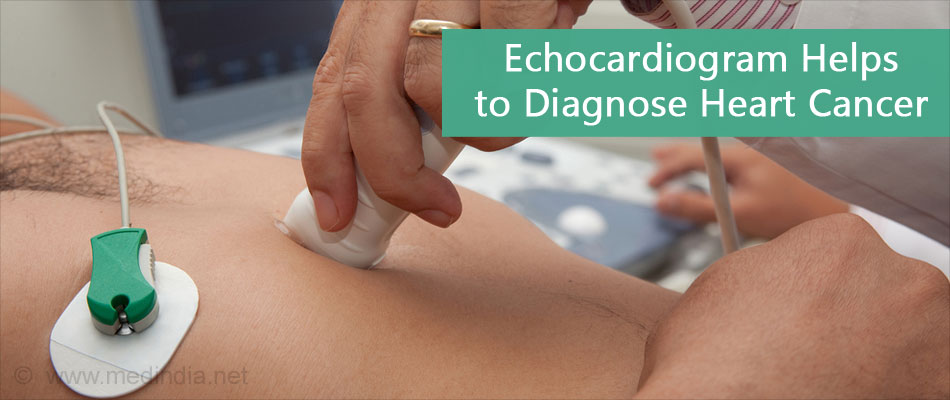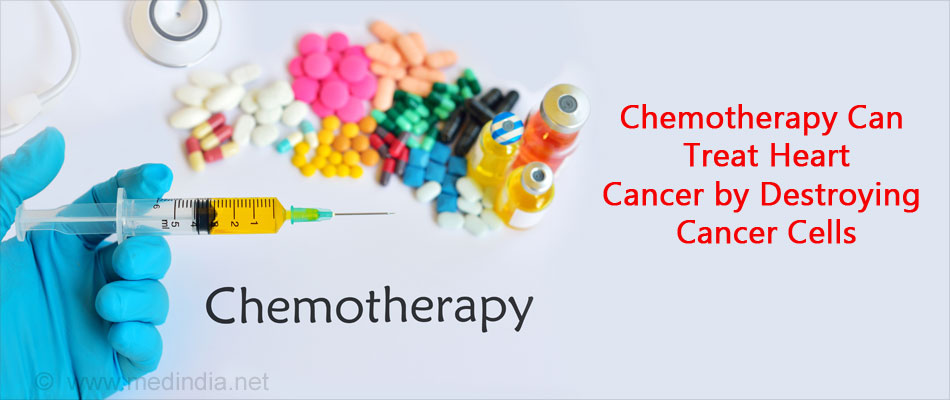- Zheng JJ, Geng XG, Wang HC, Yan Y, Wang HY. Clinical and histopathological analysis of 66 cases with cardiac myxoma. Asian Pac J Cancer Prev. 2013. 14(3):1743-6.
- Ren DY, Fuller ND, Gilbert SA, Zhang Y. Cardiac tumors: clinical perspective and therapeutic considerations. Curr Drug Targets. 2016 Jul 3.
- Patil NP, Dutta N, Satyarthy S, Geelani MA, Kumar Satsangi D, Banerjee A. Cardiac myxomas: experience over one decade. J Card Surg. 2011 Jul. 26(4):355-9.
- Salcedo EE, Cohen GI, White RD, Davison MB. Cardiac tumors: diagnosis and management. Curr Probl Cardiol. 1992 Feb. 17(2):73-137.
What is Heart Cancer?
A heart tumor is an uncontrolled growth of cells of the tissues of the heart. Tumors may be
- Primary when they arise from the same organ, or secondary when they spread from other organs
- Benign, when they do not spread to other organs, or malignant / cancerous when they spread to other organs
Primary tumors of the heart are extremely rare with most of them being benign or non-cancerous. Benign myxomas are the most common benign primary cardiac tumors.

In adults, the most common primary malignant or cancerous tumor of the heart is an angiosarcoma which are usually located in the right upper chamber of the heart. Angiosarcomas originate from the cells lining the blood vessels. They multiply and form irregular masses which protrude into chambers of the heart and surrounding structures.
Cardiac rhabdomyosarcoma is the second most common type of primary cardiac cancer in adults and the most common heart cancer in children. It originates from the heart muscle cells which become cancerous.
Other less common types of heart tumors are cardiac liposarcomas, mesotheliomas, fibrosarcomas, fibrous histiocytomas and schwannnomas.
Most malignant or cancerous heart tumors spread from cancers in other organs such as the skin (malignant melanoma), kidneys, breast or lungs. Usually, when there is a metastasis to the heart, the prognosis or outlook is not good. These occur twenty times more frequently than primary cardiac tumors even though cancer of the heart too is rare.
What are the Causes of Heart Cancer?
The causes of heart cancer are still a mystery and remain unknown as this form of cancer is very rare.
What are the Symptoms and Signs of Heart Cancer?
Early stages of heart cancer have no symptoms; however, as the disease progresses symptoms are similar to heart disease. They can occur suddenly and progress rapidly.
Symptoms of heart cancer include the following:
- Sudden and constant chest pain or pressure or tightness
- Cough with productive sputum which maybe pink or frothy colored. At times, the patient may cough up blood
- Weakness or fatigue
- Fever
- Increase in heart rate or irregular heart rhythm
- Swelling around the feet and ankles
- Sudden weight gain or loss
- Widening of fingertips - Bluish discoloration of finger nails or lips may be present due to reduction in blood oxygen levels
- Sudden change in mental status such as confusion, delirium, hallucinations or delusions. The patient may be unresponsive or consciousness may be reduced
- Reduced urine production
- Shortness of breath, difficulty in breathing, wheezing and choking sensation

Advertisements What are the Complications for Heart Cancer?
Complications of heart cancer can be serious and life threatening.
They may include:
- Irregular heart rhythm
- Heart failure
- Tumor emboli- Fragments of tumors can break off and enter the circulation. These tumor fragments may block blood flow to the brain causing stroke, as well as to other parts of the body
- Metastasis or spread of cancer to the surrounding or distant organs
How do you Diagnose Heart Cancer?
Primary heart tumors are rare and symptoms bear similarity to heart disease, making them difficult to diagnose. Heart murmurs, abnormal heart rhythms or any symptoms of heart failure can only be diagnosed as primary heart tumors after a complete evaluation of symptoms, history and high end diagnostic tests. Patients with cancer in other parts of the body who present with symptoms of heart abnormality are tested for secondary heart tumors.
Following tests are conducted if a heart cancer is suspected
- Blood tests
- Echocardiogram which shows a moving picture of the heart and valves

- MRI or CT scan of the heart, which may delineate the tumor. A chest x-ray may be used if these are not available
- ECG, which studies the electrical activity of the heart
- Cardiac catheterization- this test may sometimes be used to identify the type of the tumor.
- Coronary angiography, which is not often done to diagnose cardiac tumors
Advertisements How do you Treat Heart Cancer?
The goal of cancer treatment is to manage the symptoms and if possible, permanently cure the cancer. Treatment for heart cancer includes the following:
- Surgery to remove the cancer and preserve functioning of the heart. Complete resection is usually not possible for primary heart cancers. Heart transplantation may be an option in selected cases
- Cardiac cancers that cannot be completely removed through surgery may be administered chemotherapy or radiation to destroy cancer cells and reduce symptoms

Additional treatments that are required include the following:
- Dietary advice to maintain nutritional status of patient
- Palliative care to improve symptoms in serious conditions
- Physical therapy to improve strength, stamina and functional ability
Health Tips
Following these tips you can reduce your risk of cancer by twenty percent.
- Be active; do at least thirty minutes of exercise each day.
- Maintain a healthy weight.
- Eat healthy and in moderation.
- Keep safe blood sugar levels.
- Manage your cholesterol
- Refrain from smoking or chewing tobacco






